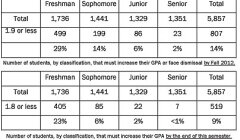Students at North Carolina Central University may feel the effects of the new grade point average policy as early as this month. The new policy states that students may face dismissal from the University if they do not achieve a cumulative GPA of at least 1.9 before the 2011-2012 school year. Fourteen percent of the student body is at risk for dismissal.
In accordance with Chancellor Charlie Nelms's proposal, this number is set to increase to 2.0 before fall 2012.
An announcement from the provost sent via e-mail last semester stated that poorly performing students must raise their grade point averages by the end of spring semester or be barred from re-enrolling in the fall.

"We're doing away with the range and having across the board GPA requirements for all students," said University Registrar Jerome Goodwin.
Academic advisers are gearing up to deal with the 519 students who may be facing expulsion this semester, as well as potentially an additional 288 by next year.
Students and advisers have been instructed to work together to create individualized strategies and plans to ensure that student grades comply with the new standard.
Deans and department chairs are expected to help advisers develop procedures for counseling students.
Some of the strategies that students may be instructed to employ may be increasing hours spent in study, meeting regularly with academic advisers, seeking outside tutoring, reducing work hours if employed and seeking help for family issues or child care that may be affecting their performance.
If students still face dismissal, there is recourse. Students may appeal a suspension. The appeal would entail appearing before the administration with a concrete plan that would acknowledge the student’s short-comings and specifically outline ways the student will improve his or her performance.
With the dean's permission the student may be allowed to continue at NCCU, under close supervision.
Students who do not provide adequate evidence that they will be able to improve their GPAs, and are facing expulsion, may be counseled to leave the university.
This may take a variety of shapes, but one option for students may be to transfer to a community college for a year or two.
After reaching the required transfer GPA, then students would be allowed to reapply and potentially re-enroll.
Goodwin stressed that the institutional policy will have a positive effect on NCCU.
"By increasing our academic standards, it's a good thing for the student, for the institution," Goodwin said. "It sends a very positive message to the community at large and to employers. When they (employers) see that we are very serious about increasing our standards, they are now more motivated to go after our students."
"Enhancing student academic success entails more than raising expectations and making structural changes," Nelms stated in his 2008 Installation Address. "We must improve the quality of student life. NCCU students deserve a more comprehensive array of cultural, intellectual, social and leadership opportunities."
Many students don't see raising GPA requirements as an insurmountable feat.
"It might be hard if someone had something major come up," says Rosalina Ramirez, a Spanish education junior. "But it shouldn't be that difficult if they just do their work."
The university maintains that raising standards for students will push them to attain their goals — not just now, but throughout their lives.
"We don't want to get rid of anybody — this is good, tough love," said Goodwin, smiling broadly as he swept his arms as though embracing the campus. "I know our students can do better.”
April Simon writes for The Campus Echo , the North Carolina Central University student newspaper, which originally published this article.